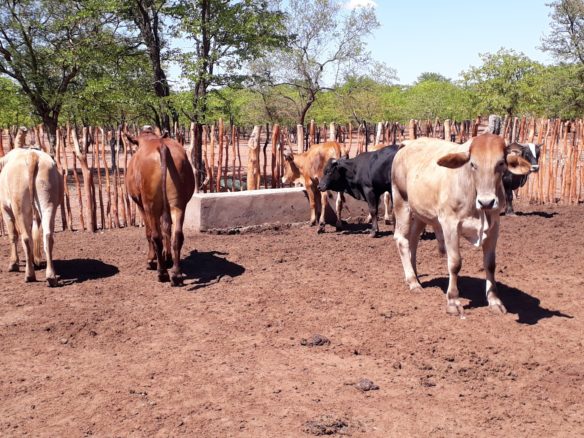A Zimbabwean farmer, Nkosibona Satenga-Dube, has turned his rural homestead in Insiza District, Matabeleland South province into a viable and highly intensive farming project.
The owner of Satenga Farm Produce – he is involved in livestock and crop production with a dairy project that has 22 cattle which produce over 500 litres of milk per day.
Satenga-Dube also looks after beef masters and white Brahmans and sells one cow for over US$1 000 weighing up to 650kg while also operating a piggery project with 80 pigs, including a poultry project and 138 goats with 30 of them being Boer goats.
All this is happening on just four hectares of land and the farmers is basing his enterprise on a climate-smart agriculture farming model.
In horticulture he has 5 000 tomato plants under a greenhouse and harvests at least 340kg a week with each crate of tomatoes selling for US$15 because of the quality.
Satenga-Dube also has an orchard with about 300 trees where he grows various fruit trees, including oranges, mangoes, naartjies and lemons.
This is coupled with a vegetable shop in Bulawayo, Zimbabwe’s second capital city where he sells his farm produce while also supplying Bulawayo markets, the Insiza community, hotels and schools with the produce.
The ever enterprising farmer also supplies milk, broiler chickens and eggs to the nearby Wanezi Mission on a large scale. The mission has a boarding school, hospital and church among other facilities.
The homestead has 20 employees including crop and animal specialists and a farm manager where he has managed to drill six boreholes to water the crops while for power he uses a solar system.
The farmer spent nearly 20 years working at farms in Johannesburg, South Africa before he decided to return home in 2016 and put into practice the skills acquired in the neighbouring country.
“We are practicing intensive farming on a small piece of land here. Farming isn’t always about having a big portion of land. Here I have only four hectares of land but I have managed to operate a dairy project, beef production, horticulture, small livestock production and an orchard,” he said.
“Under livestock I have dairy cattle, Beef masters and white Brahmans. Per day each dairy cow gives us about 20 to 22 litres of milk. Due to the limited amount of land we have here we feed our beef masters and sell them hence we don’t keep a large herd.”
He also said with tomatoes, he specialises in the Star 9037 variety, which has a longer shelf life. A Star 9037 tomato has an average mass of 160-180g with thick fruit walls.
“It has a unique resistance to disease and performs well during winter,” he said.
Satenga-Dube said plants his tomatoes in a greenhouse to ensure that they perform well and the advantage of a greenhouse was that the plant is protected from harsh weather conditions such as excessive rains and the extreme cold.
“Insiza district has sandy soils and many people complain that it is not fertile. We feed our soil so that it remains fertile. We utilise organic products that we get from the farm. There is manure that we get from the cattle as well as the chickens.
“We dry the chicken manure and feed it to cattle and then we use the cow manure for our crops. Before we plant our crops we first apply grass and then animal manure. This helps our crops to perform well,” he added.
With no formal qualification in agriculture, Satenga-Dube said it took a lot of courage to leave his lucrative and well-paying job in South Africa where he was a project manager and return home before venturing into his own farming enterprise — Satenga Farm Produce.
He said the desire to develop his own country propelled him to return.
“Home is best; you can’t be a king in a foreign land. Government has said people should benefit from their land and that’s why I decided to maximise production on my available land using my acquired skills and knowledge. This place started off a simple homestead and we gradually developed it and established these projects,” he said.
The establishment takes students from Lupane State University and Gwanda State University on internship. Satenga-Dube said they train five students for eight months and once they have completed their attachment they welcome another group. He said it is his desire to accommodate up 15 students at a time, but he has limited accommodation at his homestead.
He said farming is a viable business that he is passionate about and it his desire to have more land so that he can feed communities and groom more future agriculturalists.










Brilliant Dube! I love this
Motivating
Well done Mr Dube very impressive and so many lessons to be learnt, and your model is very common practice that was applied by our parents in the olden days of their farming. One is very motivated to learn from this model.
Comments are closed.